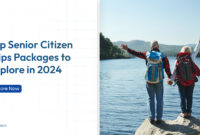Over 55 travel opens a world of exciting possibilities. This guide delves into the unique aspects of travel for those in the 55+ age group, exploring popular destinations, preferred travel styles, budgeting considerations, health and wellness tips, and the role of technology in enhancing the travel experience. Whether you’re an adventurous soul seeking active excursions or prefer a relaxing retreat, we’ll equip you with the knowledge and resources to plan an unforgettable journey.
We cover everything from choosing the perfect destination—be it a vibrant European city or a tranquil beach resort—to managing your budget and ensuring your health and safety. We’ll examine the advantages and disadvantages of various travel options, such as cruises and all-inclusive resorts, and provide practical advice on navigating the complexities of travel planning for older adults. We also highlight the increasing importance of technology in modern travel, including the use of travel apps and digital itineraries. The aim is to empower you to create a personalized travel experience that is both fulfilling and stress-free.
Budgeting and Planning for Over 55 Travel
Planning a European adventure for two over-55s requires careful budgeting and meticulous planning to ensure a comfortable and enjoyable trip. This involves considering various factors, from flights and accommodation to daily expenses and unforeseen circumstances. A well-structured budget will minimize stress and maximize the enjoyment of your travels.
Sample Budget for a Ten-Day European Tour (Two People)
This sample budget assumes a moderate level of spending for a ten-day trip to a Western European country like Italy or France. Prices are estimates and can vary significantly depending on the season, specific locations, and personal preferences.
| Expense Category | Estimated Cost (per person) | Total Cost (for two) |
|---|---|---|
| Flights (roundtrip) | $800 | $1600 |
| Accommodation (10 nights, mid-range hotels/Airbnb) | $700 | $1400 |
| Activities & Entrance Fees (museums, tours, etc.) | $400 | $800 |
| Food & Drink (restaurants, groceries) | $500 | $1000 |
| Transportation (local transport, taxis) | $200 | $400 |
| Miscellaneous (souvenirs, tips, etc.) | $200 | $400 |
| Total Estimated Cost | $2800 | $5600 |
This budget provides a reasonable framework. Adjustments should be made based on your chosen destination, preferred accommodation, and planned activities. Consider utilizing budget airlines for flights and opting for self-catering options for some meals to reduce costs.
Common Financial Concerns for Older Travelers and Solutions
Older travelers often face unique financial concerns. Addressing these proactively ensures a stress-free trip.
Three common concerns are:
- Unexpected Medical Expenses: Health issues can arise unexpectedly, leading to significant medical bills abroad. Solution: Comprehensive travel insurance with robust medical coverage is essential. Ensure the policy covers emergency medical evacuation and repatriation.
- Trip Cancellations or Interruptions: Unforeseen circumstances like illness or family emergencies can necessitate trip cancellations or early returns. Solution: Purchase travel insurance that includes cancellation and interruption coverage. This protects your financial investment.
- Limited Mobility and Accessibility Costs: Reduced mobility might necessitate additional expenses for accessible transportation or accommodations. Solution: Plan ahead and book accessible options in advance. Research accessible transportation networks at your destination and consider booking accessible rooms or utilizing mobility assistance services.
Benefits of Travel Insurance Tailored to Older Adults
Standard travel insurance may not adequately address the specific needs of older travelers. Policies designed for seniors often include:
Key benefits include:
- Higher medical coverage limits to accommodate potentially higher medical costs associated with age.
- Coverage for pre-existing medical conditions (subject to policy terms and conditions).
- Extended emergency medical evacuation and repatriation benefits.
- Specific coverage for lost or stolen medical devices or equipment.
Booking Accessible and Comfortable Flights and Accommodations
Booking travel arrangements that cater to the needs of older travelers requires careful planning.
Consider these points:
- Flights: When booking flights, request assistance with boarding and disembarking. Choose airlines known for their passenger assistance services and consider booking aisle seats for easier access to restrooms. Check for baggage allowance and consider pre-booking assistance with luggage.
- Accommodation: When booking hotels or other accommodations, specify your need for accessible rooms with features like roll-in showers, grab bars, and wider doorways. Consider proximity to transportation and amenities to minimize walking distances. Websites often allow you to filter search results by accessibility features.
Health and Wellness Considerations for Older Travelers
Planning a trip over 55 offers immense rewards, but prioritizing health and well-being is paramount to ensuring a safe and enjoyable experience. This section outlines key considerations for maintaining your health before, during, and after your adventure. Remember, consulting your physician is crucial before embarking on any significant travel plans, especially international journeys.
Essential Health Precautions for Older Travelers
Taking proactive steps before, during, and after your trip significantly reduces potential health risks. These precautions are designed to address common concerns for older travelers and help ensure a smoother journey.
- Pre-Trip: Schedule a comprehensive checkup with your doctor, including blood pressure, cholesterol, and any other relevant tests, several weeks before departure. Discuss any existing medical conditions and necessary medications. Obtain copies of your medical records and prescriptions, ensuring sufficient medication for the duration of your trip, plus a few extra days in case of delays.
- During the Trip: Stay hydrated by drinking plenty of water, especially in warmer climates. Maintain a healthy diet, choosing nutritious options whenever possible. Get regular exercise, even if it’s just a gentle walk. Be mindful of sun exposure and use sunscreen liberally. Pay attention to your body and rest when needed.
- Post-Trip: Schedule a follow-up appointment with your doctor upon your return to discuss any health concerns or issues that arose during your travels. This allows for prompt attention to any potential complications.
- Medication Management: Carry all medications in their original containers, with labels clearly visible. Keep a separate list of your medications, dosages, and physician’s contact information. Consider using a medication organizer to simplify daily routines.
- Emergency Contacts: Inform family or friends of your travel plans, including your itinerary and contact information. Carry emergency contact numbers, including your doctor, local emergency services, and travel insurance provider, readily accessible.
Travel Vaccinations and Medical Consultations for International Travel
International travel often requires specific vaccinations and medical precautions. The necessary steps depend on your destination and your individual health status.
Consulting a travel medicine specialist or your primary care physician well in advance of your trip is essential. They can advise on necessary vaccinations, recommend preventative medications for malaria or other diseases, and provide guidance on food and water safety in your destination country. Remember to allow sufficient time for vaccinations to take effect before your departure. They will also assess any pre-existing conditions that might be exacerbated by travel or the climate in your destination.
Maintaining Physical Fitness and Well-being While Traveling
Maintaining a healthy lifestyle while traveling is crucial for preventing fatigue and potential health issues.
- Incorporate Movement: Even short walks between sightseeing locations or a daily swim can significantly improve your energy levels and overall well-being.
- Mindful Eating: Prioritize healthy eating habits by choosing balanced meals and snacks. Stay hydrated by drinking plenty of water throughout the day.
- Rest and Relaxation: Schedule downtime into your itinerary to avoid overexertion. Ensure you get enough sleep each night to maintain your energy levels and prevent burnout.
- Manage Stress: Engage in relaxing activities such as reading, meditation, or listening to calming music to manage stress levels, especially during long journeys.
- Stay Connected: Maintain contact with loved ones back home to alleviate feelings of loneliness or isolation, which can impact well-being.
Recommended Items for a First-Aid Kit for Older Travelers
A well-stocked first-aid kit is essential for addressing minor injuries and illnesses while traveling. The kit should be tailored to your individual needs and any pre-existing medical conditions.
- Band-aids in various sizes
- Antiseptic wipes
- Pain relievers (ibuprofen or acetaminophen)
- Anti-diarrheal medication
- Motion sickness medication
Technology and Travel for Over 55s
Embracing technology can significantly enhance the travel experience for those over 55, offering convenience, safety, and peace of mind. From planning the perfect itinerary to staying connected with loved ones, the right tools can transform a potentially stressful journey into a seamless and enjoyable adventure. This section explores how technology can benefit older travelers at every stage of their trip.
Benefits of Travel Apps and Online Resources
Travel apps and online resources provide a wealth of information and tools to simplify trip planning and booking. Websites and apps allow users to compare flight and accommodation prices from various providers, often revealing significant savings. Many platforms offer detailed reviews and ratings from other travelers, helping users make informed decisions about hotels, restaurants, and activities. Furthermore, these resources often provide real-time updates on flight schedules, weather conditions, and local events, allowing travelers to adapt their plans as needed. For example, Kayak or Skyscanner can be used for flight comparisons, while Booking.com or Expedia offer comprehensive hotel listings and booking services. These tools significantly reduce the time and effort involved in traditional travel planning.
Technology for Enhanced Safety and Communication
Technology plays a crucial role in ensuring the safety and well-being of older travelers. GPS tracking apps, such as Life360 or Find My, allow family and friends to monitor the location of a traveler, providing reassurance and facilitating quick assistance in case of emergencies. Many smartphones offer emergency SOS features, which can automatically contact emergency services with the traveler’s location. Additionally, translation apps like Google Translate can be invaluable in navigating unfamiliar environments and communicating with locals. Having a readily available method to contact family and emergency services can dramatically reduce stress and improve safety, especially in unfamiliar territories.
Staying Connected While Traveling
Maintaining communication while traveling is essential for both safety and peace of mind. A reliable mobile phone with international roaming or a local SIM card is crucial for staying in touch with family, friends, and emergency services. Consider using messaging apps like WhatsApp or Viber, which often offer free or low-cost international messaging and calling. Portable Wi-Fi hotspots can provide convenient internet access, eliminating the need to rely on public Wi-Fi networks, which can be less secure. Regular check-ins with loved ones can also ease concerns and help maintain a sense of connection throughout the journey. Pre-planning communication strategies and having backup methods can prevent unexpected isolation.
Creating a Digital Itinerary
A digital itinerary can streamline the travel experience and ensure everything runs smoothly. A simple document or spreadsheet can be created, incorporating key information such as flight details (airline, flight numbers, departure and arrival times), accommodation reservations (hotel name, address, contact information), and planned activities (dates, times, locations, contact details). This information can be easily accessed on a smartphone or tablet, eliminating the need for physical documents. Consider using cloud storage services like Google Drive or Dropbox to ensure accessibility from multiple devices and to create backups. This approach minimizes the risk of losing crucial information and simplifies the overall travel planning process. For example, one could create a Google Sheet with tabs for Flights, Accommodation, Activities, and Emergency Contacts.
Summary
Embarking on an adventure after 55 is an enriching experience, offering opportunities for self-discovery, relaxation, and connection. By carefully considering your preferences, planning ahead, and utilizing the resources available, you can create a travel experience tailored to your needs and desires. Whether you choose to explore bustling cities, unwind on pristine beaches, or immerse yourself in new cultures, remember that the journey itself is just as rewarding as the destination. Plan well, travel safely, and enjoy the golden years of exploration!




